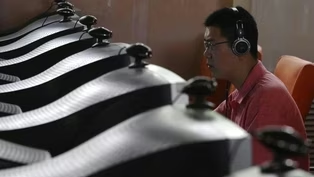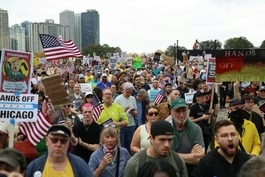
‘The Formula for Better Health’ from a former CDC director
Clip: 10/18/2025 | 6m 57sVideo has Closed Captions
Former CDC director offers an insider’s ‘Formula for Better Health’ in new book
Dr. Tom Frieden has spent his career as a disease detective, New York City’s health commissioner during a tuberculosis outbreak and CDC director during the Ebola crisis. In his new book, “The Formula for Better Health,” he shares lessons about how to close the gap between awareness of health challenges and the actions needed to solve them. Ali Rogin speaks with Frieden for more.
Problems playing video? | Closed Captioning Feedback
Problems playing video? | Closed Captioning Feedback
Major corporate funding for the PBS News Hour is provided by BDO, BNSF, Consumer Cellular, American Cruise Lines, and Raymond James. Funding for the PBS NewsHour Weekend is provided by...

‘The Formula for Better Health’ from a former CDC director
Clip: 10/18/2025 | 6m 57sVideo has Closed Captions
Dr. Tom Frieden has spent his career as a disease detective, New York City’s health commissioner during a tuberculosis outbreak and CDC director during the Ebola crisis. In his new book, “The Formula for Better Health,” he shares lessons about how to close the gap between awareness of health challenges and the actions needed to solve them. Ali Rogin speaks with Frieden for more.
Problems playing video? | Closed Captioning Feedback
How to Watch PBS News Hour
PBS News Hour is available to stream on pbs.org and the free PBS App, available on iPhone, Apple TV, Android TV, Android smartphones, Amazon Fire TV, Amazon Fire Tablet, Roku, Samsung Smart TV, and Vizio.
Providing Support for PBS.org
Learn Moreabout PBS online sponsorshipALI ROGIN: It isn't hard to find advice# for how to live a healthier life.
It's## working that guidance into your daily# routine that can be the most difficult## part.
Turning those suggestions# for better health into effective## policy is the challenge public health# professionals grapple with every day.
And right now, officials who work on these# issues are under even more pressure than usual.## Just this past weekend, the White house# fired about 1,300 staffers at the Centers## for Disease Control before rehiring half of them.# Former CDC director Dr.
Tom Frieden's new book,## "The Formula for Better Health,"# takes on these challenges.
In it,## he shares lessons from his own public# health career about how to close the gap## between awareness of health challenges# and the actions needed to solve them.
Dr.
Frieden, thank you so much# for joining us.
This book spans## your experiences over your entire career,# which you spent as a disease detective,## as New York City health commissioner during# a massive tuberculosis outbreak.
You were## CDC director during the Ebola crisis.
And# then you also witnessed the COVID pandemic.
As a former CDC director, why was it important# to you to write this book at this time?
DR.
TOM FRIEDEN, Author, "The Formula for Better# Health": I began writing this book a decade## ago in the world's first Ebola epidemic, when# West Africa was struggling with health systems## in free fall.
And it became really clear that# people don't understand what public health is,## why it is so important.
It might make the# difference between their life and their## death.
And for people in public health, there's# a lot to learn about how to do it successfully.
ALI ROGIN: You talk about the importance of# public health.
Not just that, but also the ways## in which it complements individual choices that# people make to keep their health up.
You write,## quote, promoting changes individual behavior is# not the core of public health.
It's a symptom## of public health failure.
When public# health succeeds, societal changes make## the individual's default choices healthy.
I# thought that really summed it up really well.
So why is it that public health# is a really important complement## to those individual choices?
Why is# it such a key part of the formula?
TOM FRIEDEN: It's not a question of,# is it individual responsibility or## societal responsibility?
It's both.
Society has a# responsibility to structure things so that if you## just go with the flow and go about your business,# you won't end up sick or disabled or dying young.
At the same time, it doesn't take any of us# off the hook.
There are things that we can do## as individuals.
Nobody's going to slap sunblock# on you or move your legs to exercise.
There are## certain things that you need to do yourself.
But# we as a society, we collectively as a community,## can do things that I outline in this book# that will allow each of us to live longer,## healthier lives.
They will help# our businesses be more productive,## our economy better, and as# a country, to be healthier.
ALI ROGIN: You also write about how public health# falls victim to what you call the Cassandra Curse,## named for the prophet of Greek mythology# who was able to see future tragedies,## but cursed so that nobody would believe her.## Give us an example of the Cassandra# Curse and how do we break free from it?
TOM FRIEDEN: Fundamentally, the Cassandra Curse# is about our inability to take actions in our own## best interest.
And what drives it.
What became# clear, as I did the research for this book,## what drives it is that our perceptions of# ourselves, of our world and of the future, are## not accurate.
There are inaccuracies there that# make us vulnerable to getting harmed or killed.
One of them is something called hyperbolic# discounting that we shortchange the future.## If smokers knew that they had a 50-50 chance# of dropping dead after their next cigarette,## very few people would smoke.
And# yet the likelihood of dying from## tobacco use is 50 percent, unless people quit.
One thing that we can do is we can imagine those# distant consequences as happening tomorrow,## or we can reward ourselves with things that# are good in the short term and also good in## the long term.
There are ways to break the# Cassandra Curse, but if we don't do that,## we may be condemned to tragic illnesses# and deaths that could have been prevented.
ALI ROGIN: And the framework for breaking that# curse that you lay out, you call it that See,## Believe, create, formula.
How does that work?
TOM FRIEDEN: The formula for better health is# a formula that has already saved millions of## lives.
It can save millions more, and it may# save your own.
It is see, believe, create,## see the invisible.
See things that are# affecting your health or driving things## in society or blocking your from acting or whether## or not you're succeeding.
See that# clearly to understand your health.
Believe that you can make a difference.# Because sometimes we think things are## inevitable when they're not.
And then the hardest# part, create a healthier future through rigorous,## simple, clear, systematic action# that overcomes the barriers that## will otherwise undermine our health, our# children's health, our community's health.
ALI ROGIN: The HHS is in a# period of tremendous upheaval.## Many of the programs that you champion in# this book that are critical to this formula,## such as surveillance of communities over the long# term, global health efforts, have been affected## and many of them cut.
What concerns you most# about this moment we're in terms of public health?
TOM FRIEDEN: What we're seeing is# very aggressive destruction of our## public health protections.
And you see# sometimes some of the things put back,## disease detectives put back, or people who# are working on Ebola outbreaks put back,## or the National Center for Health Statistics,# some of those individuals restored.
What worries me is that think of public health# as a house.
You know, if the window or the## door or the roof falls off, you fix it.
But if the# basics, if the foundations are being undermined,## we are less safe and we as a country# will be sicker.
We will have higher## health care costs and we will have tragic# illnesses that could have been prevented.
ALI ROGIN: The tone of this book# is still very optimistic despite## some of the challenges.
What# gives you optimism right now?
TOM FRIEDEN: I am optimistic.
Facts are# stubborn things and even if they are## ignored and suppressed, they're still facts.
And# everyone wants to live a longer, healthier life.## And there are many things that we can agree on.# We should have healthier food.
Everyone should## have a primary care clinician who supports their# health.
Our health care system should do much## more for our health and we should get conflicts# of interest out of the decision making process.
ALI ROGIN: The book is "The Formula# for Better Health."
Dr.
Tom Frieden,## thank you so much for joining us.
TOM FRIEDEN: Thank you.
Leak shows China’s ‘Great Firewall’ is being exported abroad
Video has Closed Captions
Clip: 10/18/2025 | 6m 31s | Massive leak exposes how China’s ‘Great Firewall’ is being exported to other countries (6m 31s)
News Wrap: Israel pressures Hamas to return hostage bodies
Video has Closed Captions
Clip: 10/18/2025 | 3m 13s | News Wrap: Israel says Rafah crossing will remain closed until hostage bodies are returned (3m 13s)
‘We intend to defend our democracy,’ says protest organizer
Video has Closed Captions
Clip: 10/18/2025 | 6m 46s | ‘We intend to defend our democracy,’ says ‘No Kings’ protest organizer (6m 46s)
Providing Support for PBS.org
Learn Moreabout PBS online sponsorship
- News and Public Affairs

FRONTLINE is investigative journalism that questions, explains and changes our world.

- News and Public Affairs

Amanpour and Company features conversations with leaders and decision makers.












Support for PBS provided by:
Major corporate funding for the PBS News Hour is provided by BDO, BNSF, Consumer Cellular, American Cruise Lines, and Raymond James. Funding for the PBS NewsHour Weekend is provided by...


